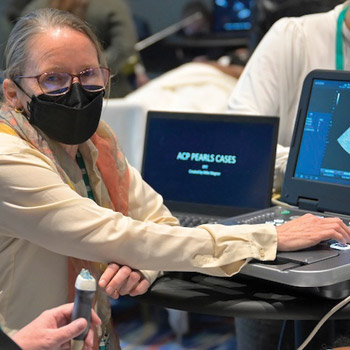Chapter advocacy key to advancing ACP's priorities
ACP's legislative staff are following four key court cases on affirmative action, gun violence, climate change, and women's reproductive health care rights.
“Equal Justice Under Law.” This is the Supreme Court of the United States' motto and the words printed above the entrance to the building where the court resides. According to the court's website, it “is the highest tribunal in the Nation for all cases and controversies arising under the Constitution or the laws of the United States.” And there is little question about the court delving into several controversies this year.
In 2022, there are four key court cases that ACP is watching, on affirmative action (Students for Fair Admissions v. Harvard, combined with a separate lawsuit at University of North Carolina, Chapel Hill, that challenges the use of race as one factor in admissions), gun violence (New York State Rifle & Pistol Association Inc. v. Bruen, regarding the ability to carry concealed, loaded firearms in public spaces with no “proper cause” requirements), climate change (West Virginia v. Environmental Protection Agency, regarding the EPA's ability to regulate greenhouse gas emissions in nearly any industry as long as it considers cost, non-air impacts, and energy requirements), and women's reproductive health care rights (Dobbs v. Jackson Women's Health Organization, regarding Mississippi law that bans abortion after 15 weeks of pregnancy).
When it comes to Supreme Court cases, as well as other cases in district courts across the country, ACP first takes a close look at the issues involved and assesses them based on our current policies, all of which can be found on our Where We Stand page and in the College's policy compendium. Cases that are before the Supreme Court will have obvious national implications; however, ACP does at times review and engage in judicial advocacy (typically via joining amicus briefs, also called “friend of the court” briefs) at the district court level when actions taken by those courts can directly support or undermine established ACP policy and have potential national implications.
With regard to affirmative action, a case that will be argued in fall 2022, ACP's policy supports institutions of higher education appropriately considering a person's race and ethnicity as one factor in determining admission in order to counter the impact of current discriminatory practices and the legacy of past discriminatory practices and better reflect the current composition of the population. The College's policy on the issue of concealed carry is not as specific as the case at hand—ACP recommends that states should not be required to accept concealed carry permits from other states with weaker standards to obtain such permits. These are cases we are watching, but to date we have not taken any additional action, although it is likely we will join in an amicus brief on the affirmative action case in the coming months.
The other two cases at hand are areas where we have engaged, and where decisions are expected in June of this year. ACP joined with the Medical Society Consortium on Climate and Health and the American Thoracic Society, among others, to submit an amicus brief in the West Virginia v. EPA case in support of the EPA. This brief outlines the human health threats posed by climate change and argues that the EPA's Clean Power Plan was within the agency's statutory authority to establish carbon pollution standards. The decision to join this brief is based on the College's robust policy on climate change, public health infrastructure, and health disparities. With regard to the reproductive health case, we joined with the American College of Obstetricians and Gynecologists (ACOG) and many others to submit an amicus brief stating that the law at the center of the case would interfere with the patient-physician relationship and limit access to evidence-based, safe, and accepted reproductive services for patients. This case, Dobbs v. Jackson Women's Health Organization, involves a Mississippi law banning all abortions over 15 weeks gestational age except in medical emergencies and in the case of severe fetal abnormality. On May 2, a draft majority opinion in this case was leaked that indicates a likelihood that the decision will overturn Roe v. Wade and Planned Parenthood v. Casey and eliminate the federal standard regarding abortion access. ACP's policy on this issue is focused on respect for the principle of patient autonomy on matters affecting patients' individual health and reproductive decision-making rights, including about types of contraceptive methods they use and whether or not to continue a pregnancy. The College also opposes any governmental interference in the patient-physician relationship in any manner that intrudes into the realm of medical professionalism.
Does ACP's engagement in these amicus briefs make a difference? I believe the answer is yes, even if a case does not go our way. History will be the ultimate answer, but it is our responsibility to speak out on critical issues based on the policy that has been established by the College. One recent case demonstrates that the judges and justices do take these briefs into account when debating a case. ACP strongly supported the Biden administration's COVID-19 vaccination and testing rules for large employers and health care workers. Therefore, we joined multiple amicus briefs in district courts and ultimately with the Supreme Court to call attention to the importance of vaccinations in these settings. While the rule for large employers was overturned, the CMS rule for health care workers was upheld, and in the majority opinion on this case our brief was specifically cited. The justices stated that “All this is perhaps why healthcare workers and public health organizations overwhelmingly support the Secretary's rule” and further noted that “Indeed, their support suggests that a vaccination requirement under these circumstances is a straightforward and predictable example of the ‘health and safety’ regulations that Congress has authorized the Secretary to impose.”
Additional laws and resulting court cases on the issues discussed above, as well as on issues such as LGBTQ rights, gender-affirming care, use of race/racism as a risk factor in treatment decisions, scope of practice, and others, are moving forward in states across the country. ACP is doing our best at the national level to track these issues and respond or act whenever we can; however, we do not have the capacity to analyze all state-level legislation, regulations, and court cases. Therefore, we need your help.
First, on any state-level issue, chapters have wide discretion to exercise their best judgment, informed by ACP policy. If a chapter is uncertain about ACP policy in an area after checking our compendium, then they can reach out via an online questionnaire, which will allow us to triage the request and track the issues we are hearing about.
Second, ACP offers a number of action- and information-oriented toolkits on key issues that are arising at the state level, including on workplace violence, period poverty, the inclusion of mental health questions on licensing and credentialing applications, scope of practice, and more. As we move further into 2022 and beyond, when we expect that cases such as those now before the Supreme Court will have a significant impact on how policy is made and implemented across the country, the College will be offering even more toolkits and resources to help our chapters and individual members engage in proactive ways. ACP can only do so much at the national level, particularly at a time when policymaking is shifting so significantly to the states. We will need your help to ensure we are meeting our responsibility to advocate effectively on behalf of internal medicine physicians and their patients.





